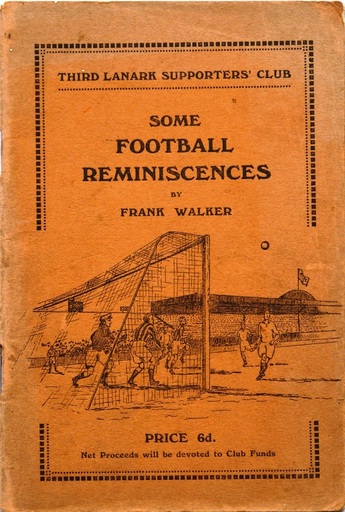It is a curious feature of Scottish sporting biography that very few footballers committed their story to print in the early days, and not until the 1950s was there any kind of vogue for publishers to attack the market: George Young's Captain of Scotland (1953) was the first hardback of the genre. Before then, just a few paperbacks were produced: James B Niven's Scottish Football Story (1906), Mattha Gemmell o' Clyde (1943), Jerry Dawson's Memoirs (1949) and A Lifetime of Soccer by referee Peter Craigmyle (1949) being the others that come to mind. There were ephemeral pamphlets such as those by Walter Arnott and Tommy Walker, while some footballers were interviewed about their lives for newspapers, but few of these stories are readily available. All of which makes Frank Walker's little booklet particularly valuable for the historian.
Walker was a talented but not particularly famous footballer, with one international cap to his name, a defeat to Wales in 1922. That match was a bit of a farce, with two inches of snow on the ground at kick-off and snow continuing to fall through the game; yet players in those days seemed to accept challenging conditions without complaint: "It was very difficult to pass at all accurately, as the weight of the ball was continually changing. On one occasion the ball would be coated with snow, whereas on the next occasion you might receive it direct from a throw-in after the half-back had carefully removed all the snow. It was practically impossible, therefore, to judge correctly on the spur of the moment the exact weight necessary to transfer the ball the desired distance."
Another anecdote told of the time he scored a hat-trick for Third Lanark against Aberdeen, and on returning to the pavilion at the end of the game the club chairman, a Colonel Wilson, presented him with 'a crisp treasury note wherewith to provide the necessary hat'.
Frank Walker served in France in the Great War with the Royal Field Artillery, and was lucky to escape unscathed. He combined his football career with work in the civil service as an income tax inspector and died in Edinburgh in 1949, aged just 52.
To read the book, and a range of other Scottish sporting works, go to the Digitised Books page.

 RSS Feed
RSS Feed